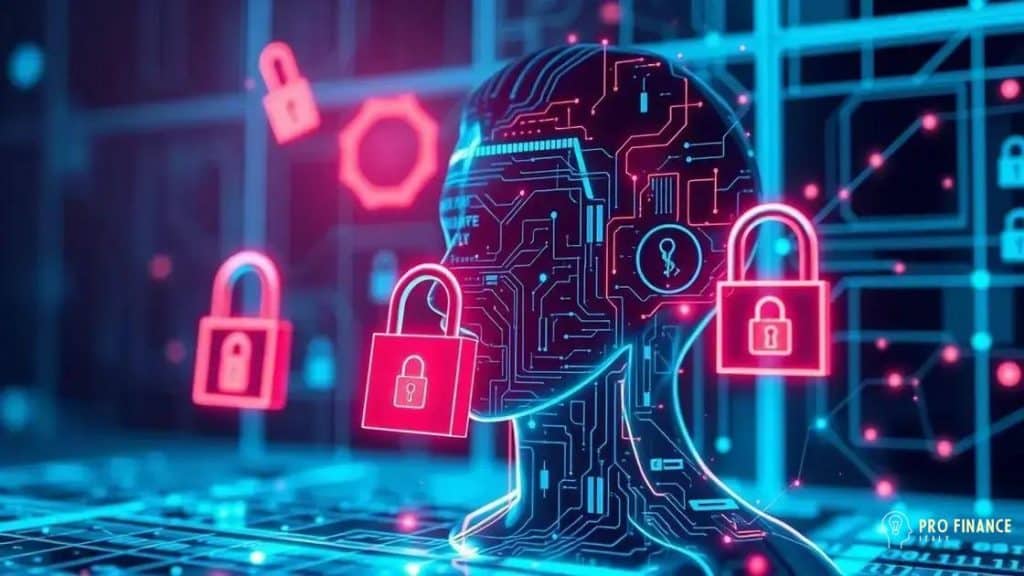The role of blockchain in securing digital identities

The role of blockchain in securing digital identities involves decentralized control, enhanced privacy, and reduced fraud through advanced encryption and verification methods, transforming how personal information is managed and protected online.
The role of blockchain in securing digital identities is becoming increasingly important as more personal information moves online. Have you ever wondered how you can protect your data against cyber threats? This article will explore how blockchain can enhance security and privacy.
Understanding digital identities in the modern world
Understanding digital identities in the modern world is essential as we rely on technology for daily tasks. Our online presence often represents who we are, making it crucial to comprehend how digital identifiers function.
What are digital identities?
A digital identity is a collection of personal information that represents an individual online. This can include usernames, profiles on social media, and even email addresses. Managing this identity is vital in today’s interconnected world.
Importance of digital identities
Digital identities play a significant role in various aspects of our lives:
- Accessing online services securely
- Connecting with others through social networks
- Conducting financial transactions safely
As more services move online, the need for secure and reliable digital identities increases. Using strong authentication methods and maintaining privacy can help safeguard this information.
Moreover, society needs to recognize the implications of data breaches. A compromised digital identity can lead to identity theft, which is why protecting our information must be a priority.
The impact of technology on digital identities
With advancements such as blockchain, securing our digital identities has never been more robust. By utilizing decentralized technologies, individuals can maintain control over their information.
As we continue to navigate our digital identities, practicing good online habits is paramount. Regularly updating passwords and being cautious about sharing personal data can significantly reduce risks. The more we understand our digital identities, the better we can protect and manage them.
How blockchain technology works

How blockchain technology works is an intriguing topic that shapes the future of many industries. At its core, blockchain is a decentralized digital ledger that records transactions across multiple computers. This means that once information is added, it cannot be easily altered or deleted, providing a secure environment for data.
Key components of blockchain
Blockchain technology operates using several key components:
- Blocks: Each block contains data, a timestamp, and a link to the previous block.
- Decentralization: No single entity controls the blockchain; instead, it is managed by a network of users.
- Cryptography: Strong encryption methods ensure that transaction data remains secure.
These elements work together to create a reliable system for recording information. The decentralization aspect is particularly important because it prevents any one party from gaining too much control over the data.
How transactions are verified
When a transaction occurs, it gets grouped with others in a block. Network participants known as miners verify these transactions through a consensus mechanism. This process often involves complex calculations, ensuring that all participants agree before the block is added to the chain.
Once verified, the block becomes part of the permanent ledger. This transparency helps build trust among users, as everyone can see the transaction history. It also reduces the risk of fraud since altering any information would require consensus from the majority of the network.
In many cases, blockchain can be used for purposes beyond just currency. It is being explored for applications in supply chain management, healthcare, and even voting systems. Understanding how blockchain technology works enables us to comprehend its potential impact on various sectors.
Benefits of using blockchain for identity security
Benefits of using blockchain for identity security are gaining attention as more individuals and organizations recognize the need for stronger protection of personal data. By utilizing this technology, we can enhance privacy, reduce fraud, and ensure greater control over personal information.
Enhanced Privacy
One of the primary advantages of blockchain is its ability to provide enhanced privacy. Unlike traditional systems, blockchain allows users to share only necessary information while keeping the rest hidden. This selective sharing helps safeguard against unauthorized access.
Decentralized Control
With blockchain, control over identity does not rest with a single central authority. Instead, users have sole custody of their data. This decentralized control means individuals can manage their identities without relying on third-party services that often introduce risks.
Reduced Fraud
The security protocols of blockchain significantly decrease the chances of identity theft and fraud. Each transaction is encrypted and time-stamped, making it much harder for cybercriminals to manipulate data. Users can confidently perform transactions knowing their identities are protected.
By providing a transparent and immutable record, blockchain helps to establish trust among users and organizations. When individuals know their information is securely recorded, they are more likely to engage in transactions online.
Moreover, many industries are adopting blockchain to meet regulatory compliance. This ensures that proper protocols are followed in data handling, further enhancing identity security within various sectors. In fields such as finance and healthcare, where sensitive information is exchanged, this technology plays a crucial role.
Challenges in implementing blockchain solutions

Challenges in implementing blockchain solutions are critical to understanding how this technology can impact various industries. Despite its many benefits, organizations face several hurdles that can hinder adoption and integration.
Technical Complexity
One of the main challenges is the technical complexity of blockchain systems. Building a blockchain solution requires specialized knowledge and skills that may not be readily available within many organizations. Developers need to understand cryptographic principles, consensus mechanisms, and network protocols, which can make development more difficult.
Scalability Issues
Another significant issue is scalability. Many blockchain networks, especially those that rely on proof-of-work systems, struggle to handle a high volume of transactions. This limitation can lead to slower transaction times and increased costs as the network grows.
Regulatory Uncertainty
Furthermore, there is an ongoing concern regarding regulatory uncertainty in many jurisdictions. As governments and regulatory bodies catch up with technology, businesses may find themselves navigating a complex web of regulations that can change rapidly.
This uncertainty can discourage investment in blockchain technology and hold back its potential. Organizations may hesitate to develop solutions if they are unsure of future compliance requirements.
Integration with Existing Systems
Integrating blockchain solutions with existing systems can also pose challenges. Many companies have legacy systems that may not interact easily with new technologies. Providing compatibility often requires significant re-engineering of current workflows, making the transition complicated.
Additionally, internal resistance to change can hinder implementation. Employees may be unfamiliar with blockchain and reluctant to adopt new processes, leading to slower adoption rates. By addressing these challenges, organizations can better position themselves to leverage the advantages of blockchain technology.
Future trends in blockchain and digital identity
Future trends in blockchain and digital identity are shaping the ways we think about privacy and security in our online lives. As technology continues to evolve, the possibilities for enhanced identity management using blockchain are expanding.
Decentralized Identity Solutions
One notable trend is the rise of decentralized identity solutions. These systems allow individuals to control their personal information without relying on centralized authorities. This emergence leads to increased privacy and security.
Interoperability Among Blockchains
Another significant development is the push for interoperability among blockchains. As various blockchain networks are created, finding ways for them to communicate and share data seamlessly is becoming essential. This trend will enhance the user experience and facilitate the exchange of information across platforms.
Integration with Artificial Intelligence (AI)
Integrating blockchain technology with artificial intelligence (AI) is also gaining momentum. By leveraging AI, blockchain can enhance security measures, automate processes, and improve user authentication. This combination has the potential to transform how digital identities are verified and managed.
The adoption of regulations that promote transparency will also influence the future of blockchain and digital identity. As governments recognize the importance of securing personal data, regulations may create standards for how identities should be managed across different platforms.
Moreover, the increasing demand for secure online transactions will drive innovation. Businesses will need to invest in advanced blockchain solutions to remain competitive while ensuring the safety of their client’s information. The merging of blockchain with other technologies like the Internet of Things (IoT) will further complicate interactions and identity management, providing new possibilities and challenges in the future.
FAQ – Frequently Asked Questions about Blockchain and Digital Identity
What is blockchain technology?
Blockchain technology is a decentralized digital ledger that securely records transactions across multiple computers.
How does blockchain enhance digital identity security?
By allowing individuals to control their personal information and reducing reliance on centralized authorities, blockchain enhances privacy and security.
What are some challenges in implementing blockchain solutions?
Challenges include technical complexity, scalability issues, and regulatory uncertainty that can impact adoption.
What future trends should we expect in blockchain technology?
Future trends include decentralized identity solutions, interoperability among blockchains, and the integration of AI for improved security and functionality.





